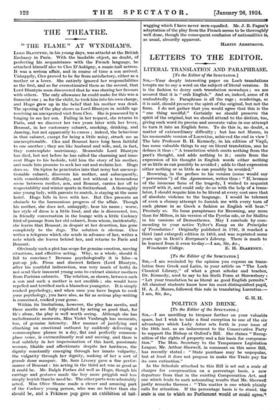THE THEATRE.
" THE FLAME " AT WYNDHAM'S.
Loan BLANTYRE, in his young days, was attach6 at the British Embassy in Paris. With the laudable object, no doubt, of perfecting his acquaintance with the French language, he attached himself also to Cleo D'Aubigny, a music-hall actress. It was a serious affair, and in course of time a son arrived. Unhappily, Cleo proved to be far from satisfactory, either as a mother or a lover. She entirely ignored her responsibilities as the first, and so far overestimated them as the second, that Lord Blantyre soon discovered that he was sharing her favours with others. The only allowance he could make for this was a financial one ; as for the child, he took him into his own charge, and Hugo grew up in the belief that his mother was dead. The opening of the play shows us Lord Blantyre in middle age receiving an unexpected visit from Cleo. She is possessed by a longing to see her son. Failing in her request, she returns to Paris, and we discover her two years later with her lover, Boussat, in her customary cabaret, smoking, drinking, and dancing, but not apparently to excess ; indeed, the behaviour in that cabaret, except for being a little noisy, struck me as unexceptionable. Cleo and Boussat have long been faithful to one another ; they are like husband and wife, and, in fact, they contemplate matrimony. Meanwhile Lord Blantyre has died, but not before he has called the charming and inno- cent Hugo to his bedside, told him the story of his mother, and made him promise to seek her out and reclaim her. Hugo does so. On tiptoe he penetrates into that noisy but unexcep- tionable cabaret, discovers his mother, and subsequently, with considerable difficulty, and not without a tremendous scene between mother, son, and Boussat, carries her off to respectability and winter sports in Switzerland. A thoroughly nice young lady, with parents to match, is staying at the same hotel. Hugo falls in love with her. But Cleo presents an obstacle to the harmonious progress of the affair. Though his mother, she does not, unhappily, bear his name ; worse, her style of dress is a little loud, and she is discovered, too, in friendly conversation in the lounge with a little Cockney bird-of-passage from her old cabaret, from whom, incidentally, she learns that Boussat, in despair at her desertion, has gone completely to the dogs. The solution is obvious. Cleo writes a telegram which she sends in advance of her, writes a note which she leaves behind her, and returns to Paris and Boussat.
Obviously such a plot has scope for genuine emotion, moving situations, and effective acting. Why, as a whole, should it fail to convince ? Because psychologically it is false—a put-up job. Pious and discreet fathers (Lord Blantyre, after his youthful indiscretion, was very much of both) do not send their innocent young sons to extract sinister mothers from Parisian cabarets. The relation, as shown, between such a son and such a mother is not credible ; she would have repelled and terrified such a blameless youngster. It is simply cooked psychology, and when once you have begun to cook your psychology, you have also, as far as serious play-writing is concerned, cooked your goose.
Within its limitations, however, the play has merits, and these merits are fully exploited by acting so good that, for th's alone, the play is well worth seeing. Although she ha-s melodramatic moments, Miss Violet Vanbrugh has moments, too, of genuine intensity. Her manner of justifying and clinching an emotional outburst by suddenly delivering a commonplace phrase in a dry, flat and perfectly common- place voice, is extraordinarily real and moving, and there is real subtlety in her impersonation of this hard, passionate woman, likable and affectionate despite her hardness, the dignity constantly emerging through her innate vulgarity, the vulgarity through her dignity, making of her a sort of grande dame manquee. Mr. Sam Livesey gave a fine perfor- mance of Boussat : his acting in the third act was as good as it could be. Mr. Ralph Forbes did well as Hugo, though his carriage and gestures made the boy more priggish and less simply boyish than he need be. The other parts were admirably acted. Miss Olive Sloane made a clever and amusing part of the Cockney young person, who was no better than she
should be, and a Pekinese pup gave an exhibition of tail- wagging which I'have never seen equalled. Mr. J. B. Fagan's adaptation of the play from the French seems to be:thoroughly well done, though the consequent confusion of nationalities is as usual, absurdly apparent.
MARTIN AnsisrsoNG.


































 Previous page
Previous page